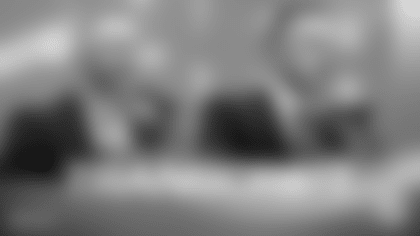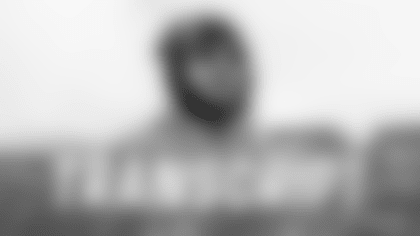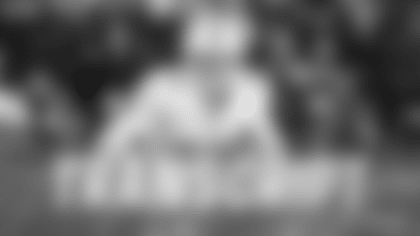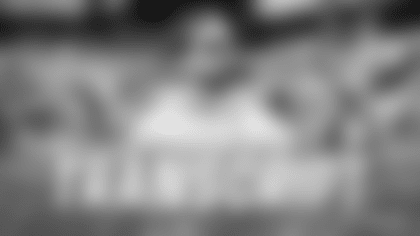Read the transcript from Head Coach Mike McDaniel's press conference on Sunday, Aug. 21, 2022.
(l was going to ask you aside from CB Byron Jones, is there anyone on the team whose status must play out, is there anybody on the team whose status you think is in question for the regular season opener based on the injury information you've gotten?) – "I think all of the guys that we've discussed that are on the active roster, there's no surprises at all. We're working diligently to change that PUP to full go, and when that happens, we'll have more information. But no, there's not off the top my head any surprises. I try not to keep surprises from you guys."
(I guess I'll a little bit more specific. With CB Byron Jones, do you expect him this week to be able to practice?) – "With Byron, you really don't have to worry about there being any secret agenda. It's the same as it has been. The thing with him is you guys will know immediately when he's able to practice because then he'll be taken off PUP. There won't be any surprise attacks with that."
(WR Jaylen Waddle and T Terron Armstead, we saw Waddle miss a few practices. Armstead one and a half, kind of… and obviously didn't play in the preseason game. How are they?) – "Both of them are doing real well. With (Terron) Armstead, that's a guy that's done it in the league at a high level and we're trying to make sure that he's ready to go Week 1. We evaluate that on a day-to-day basis. He's been practicing but we're trying not to overload him. He's invested a good amount this offseason – more typically than he usually does. We're just trying to be smart with that. I don't have any concerns for Week 1 at all. The plan is that you guys will see him a little bit this week for sure. With Waddle, that's just an exercise of restraint because I think I would probably be less cautious had he not come back from – out of any player on the team, his jump in the scheme from OTAs to training camp was the highest. He was doing well but kind of swimming in the playbook. I was very interested to see a second-year guy with his first offseason how he was going to come back for training camp. He exceeded my expectations and you guys know I have high expectations for him. So when we noticed something was a little tight, we really, really wanted to be preventative. We've been extra cautious with him just knowing where he's at in his game within the offense and how well he's doing. This week we plan to get him involved a little bit, but I plan to be very cautious with him as well just knowing what he means to the team and how we don't want him to have any lingering setbacks. We want him full speed. We rely on him for a multitude of things and we want to make sure he's comfortable and 100 percent full go. He's starting to get pretty annoyed with how cautious we're being, but I think it's to his credit and I think it's the best thing for the Dolphins and I think you guys would be mad at me if I wasn't."
(What goes in your process of selecting a guest speaker for the team at the team meetings? I know you all have different visitors throughout the course of this training camp, but what goes in your process of selecting?) – "Guys that have really achieved high things in whatever their walk is – football primarily. Out of all of the pool of guys, whoever says the strongest compliments to me and strokes my ego the most. (laughter) It all depends on what you're trying to get across. We have so much access here in the city of Miami and then just the people involved in the organization to various people that have done such great things in their life whether it's football or it's MMA or whatever it is. It's all about finding people that in one way, shape or form can help deliver and reiterate and give a new framing to the messaging that's important for where our team is at. You look and see who maybe would inspire, maybe – they hear my voice every day so maybe a different voice hitting the same point at a different angle to just better hit home at things for the team to hear, as well as, I think there's also something to be said about experiencing things together – a shared experience where you get someone who is elite at what they're doing to come and speak and it's pretty cool. Well, you're sharing that with your teammates in that moment and that just kind of brings you together that much more with that shared common experience. I don't trivialize the players' time in the least. They know I put a lot of time into team meetings in general. So when someone is able to come into our close quarters and into our circle, it's something they have high regard for and generally through our experience, it's been pretty successful with getting the points across that we want to get across."
(On the same topic I was curious what you took away from your visit with Erik Spoelstra last week and did he talk to the team?) – "That was awesome. He had some of his staff members there, too. His experience is just so unique in that he came in as a rookie head coach and I think he had pretty high expectations off the jump. Then to carry on success in different formulas – I'm not sure if this is true, but I think Boston had something going on but he's one of the formula that's pretty popular in the NBA now with three superstars – he had success in doing that. He also had success in different ways in maintaining one type of culture and being able to do it with a roster that was built – or really the production from the roster coming a little more spread out, seven, eight or nine people deep. We just talked really about the commonalities. It was interesting. He was pretty interested in YAC, which was a cool conversation because a lot of terms that we use for YAC, I kind of use basketball terms to kind of illustrate it. That was a cool conversation as well. It was more just can we get things from each other. Very different sports but very similar in that we're all dealing with a time where the athletes are as athletic and finely-tuned as they ever have been in their lives. As a result, you have to train them differently. The days of – case in point – Larry Csonka and Don Shula four-a-days; those are things of the past. He even spoke about how things are a little bit different and how they approach things since 2010 and the physicality of practices and all those things. There wasa lot of commonality even though the sports are very different. It was just an awesome opportunity to have him around. I'm pretty sure that Tyreek jumped on the opportunity to land some courtside tickets in the process as well. He was grinding for that. When Tyreek first got here, he asked me for tickets to the Heat game and I said you're talking to the wrong guy. I do not have a connection."
(So when you're talking basketball about spacing and ball movement and screens and picks, I'm not the biggest basketball fan and I'm not sure how much you watch. I'm sort of wondering how that relates to getting your receivers into open positions.) – "Oh you've got me going now. You're dead right, though. We had the same conversation. I floated it out here because I don't pretend to be an expert in basketball but in my experience and just generation, we've watched three-point percentages completely change, the range from where good shots are taken from, fast break three-pointers and just how the shooting range of players expands the defense. They have to guard more floor space, which theoretically and kind of the way we look at football specifically on offense is we're trying to make a defense defend maximum amount of space. We do that with our principles of outside zone but also speed. One of the reasons you like speed is because now the defense has to defend more ground, so it's kind of a similar philosophy of creating space. You do it in basketball with shooters so then you have to draw defenders out giving more space underneath and you do it in football with playing fast and having speed so that in the timing of the play defenders have to defend that much more area. Because in both sports, defenses are trying to do the same thing and that's really, you're really trying to compress the area that they have to defend. It was a really cool conversation. It's something we couldn't really forecast exactly where it was going to go but I think it was beneficial for both and I think there are some commonalities for sure in that."
(Where do you stand on the possibility and maybe even recoil when I say this of using one roster spot out of 53 for a third-string quarterback?) – "Where do I stand? Well, as I stand behind this podium, I think the 53 is for the 53 best players. You're open to whatever. You have to consider a lot of different things and sometimes that leaves you short or heavy in certain positions, but what I've found in my career is that you don't pigeonhole yourself and make absolutes. You'd like to carry a certain amount of players and you'd like to have your cake and eat it, too, a lot of items. But when individuals' performances merit it, you have to keep the 53 best players. I've done both in my career – I've had two, I've had three. There could be a scenario down the line some day that you'd want four and it might make sense. I'm not completely resistant to anything like that when we're in the business of keeping good football players and you don't always get to decide here they come from."
(Your rookie class has been very productive so far the first two preseason games and I think according to the Jimmy Johnson draft chart you guys had the least amount of draft capital in that regard this year. How was that able to happen when you don't have the draft capital, but they're still producing at a high level?) – "You just know you can't stop developing from the ground up so to speak on an NFL roster. So when you have limited resources – this wasn't the first time I've been part of that – but you just know the stakes. The fact that you have limited resources means that you can spend more time in a given area projection of the draft. But it also puts pressure on you where you can't afford to miss because then you have players under rookie contract – the way the CBA is written and the way the salary cap is, it catches up to you if you don't have contributions from success of draft classes. It's to the credit of Chris Grier and the scouting department, all of the position coaches and coordinators. When you have those limited resources, you know you need to get contribution from the class so you have to really dig your heels in and make sure that you're not missing on those limited selections and opportunities."
(Do you change the philosophy or practice plan from the first join practice against Tampa to the Eagles knowing you're a little bit closer to the season?) – "I really, really test the entire building and organization with changes because it's my philosophy to always change, to think through stuff – maybe it doesn't change, but a lot of times you're altering stuff depending on your exact situation. I think that's more to do with the amount of reps that you can take and where your most depth is, the decisions you have to make in the pending future in those opportunities. Are you asking from a schematic (standpoint)?"
(Against Tampa we saw a lot of one-on-ones and high intensity stuff. Does that change or you take advantage of that now knowing you do have time off between, there's like a week in between the last preseason game?) – "That's the nature of joint practices. It's hard. Guys are competitive and you plateau to a degree when you're going against the same people all the time but then you get this random influx of different types of players and the competitor in each individual player – even if we tried to tone down in the intensity, it would be hard because they want to beat that guy across from them and prove it and they get more opportunities in joint practices where you can go a quarter as a receiver and maybe not catch man coverage or if you do catch man coverage, maybe the ball doesn't go to you. Well, joint practice, you line up and how many one-on-one reps can I take? Because if I take six, I'm going to get six man-to-man opportunities and get the ball six times. So what I can I do with that? The only thing that we really would adjust is maybe the length of it, but the intensity and exactly what you're doing, that's hard to adjust and that kind of defeats the purpose of the joint practices."
(There's been a rising number of teams I guess in the last few years running similar variants of your offense. There's always the offense catching up to defense, defense catching up to offense. I'm curious your early, I guess observations of how defenses are maybe adjusting to what you guys have at least shown in this point of preseason.) – "You're exactly right. It is cyclical and people are always evolving because people are always working because there's always competition within the coaching ranks of who can have the answers to the test. I do think that there are – the second people put something on tape that proves one way or the other on both sides of the ball to gives something problems, you'll continue to see it again. That's cyclical and you just kind of have to figure out how to take advantage of that because when you're defending one thing, you're not defending another thing. I think that started probably in 2018 – teams really started kind of showing up on game day against our offense and displaying stuff they hadn't put on tape before. At that point in time was very concerning. It would just really rattle players and coaches alike because you just weren't used to all of a sudden a defense showing up besides when you'd play the Patriots or something that teams were kind of what they were. But that has been something that through all those reps you kind of get used to and so it's both the idea of having people come to game day and try stuff differently. I've become a lot more comfortable as the years have gone on as well as those little – it's a copycat league so if you see edge pressure one week, you're going to see it again and just like in the regular season it's similar formula in the preseason because then defenses get the opportunity to say hey, well, this worked for this team. We don't plan on doing this, so what have we got to lose? Let's do it against this team in the preseason and throw their opponents off the scent and make them prepare for the stuff they just put in the preseason. So it's a nice low-cost high-reward formula that fortunately – it was unfortunate at one time – but fortunately I've been used to and have a lot of reps at going through the years."














